Diplomatic Bluebook 2021
Chapter 5
Japan's Diplomacy Open to the Public
2 Consular Service and Assistance for Japanese Living Overseas
(1) Improving Consular Service
With the aim of providing quality consular services to Japanese nationals overseas, MOFA conducts a questionnaire survey every year on services such as consular staff's attitudes in over-the-counter and telephone responses as well as work implementation status at diplomatic missions overseas. The survey conducted in January 2021 covered 145 diplomaticmissions overseas and received valid responses from 18,349 people. The survey results suggested that respondents were for the most part satisfied with the level of consular services provided by diplomatic missions overseas. Nevertheless, some respondents also submitted views calling for improvements in consular staff's attitude to users, including that staff seem to adopt matter-of-fact attitudes and terms of speech. MOFA takes user feedback such as this seriously, and will continue its efforts to enhance services and make improvements so as to provide better consular services that are oriented to the perspective of its users.
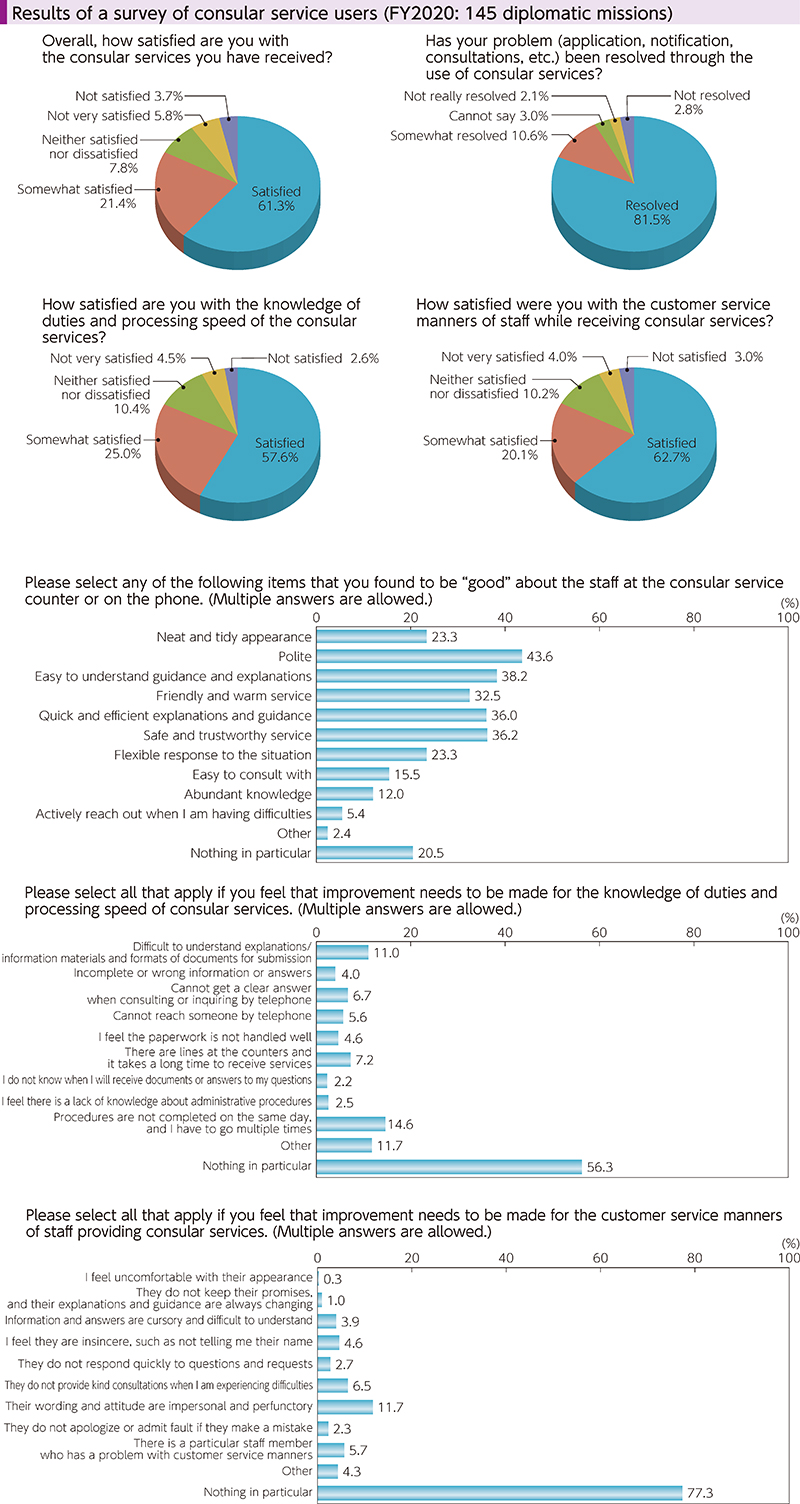
(2) Passports: Maintaining trustworthiness, enhancing convenience and making administrative tasks more efficient
From February 2020, MOFA began issuing new passports that adopt Katsushika Hokusai's “Thirty-six Views of Mount Fuji” series on all the visa pages (see the Special Feature on page 347).
1.34 million passports were issued in 2020, falling by 70.3% compared to 2019 and reflecting the significant drop in the number of people heading overseas amid the global spread of COVID-19. As of the end of December, there were approximately 27.71 million valid passports in circulation.
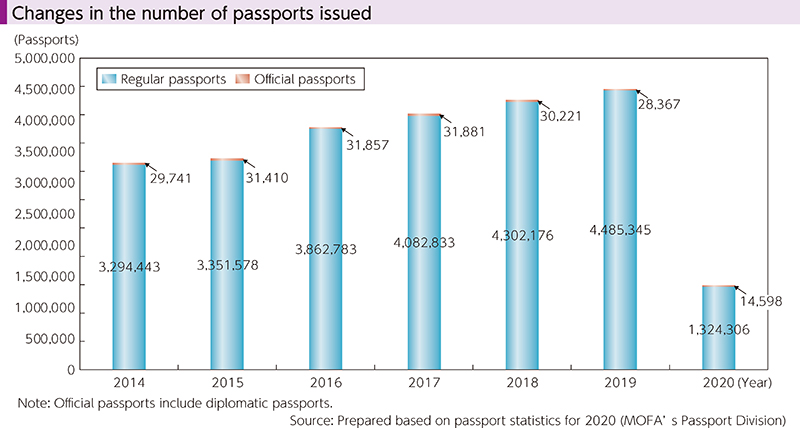
Realizing a digital society is becoming a pressing issue, which is also the case where passport issuance applications are concerned. On the basis of the “Digital Government Execution Plan” that was amended in December, from FY2022, it will become possible to apply for passports online. In designing that system, MOFA is striving to utilize existing infrastructure, including the My Number Portal (a government-run online service concerning administrative procedures and other processes), reduce the number of times necessary for applicants to appear before the counters in person, and digitalize administrative operations, while simultaneously maintaining the trustworthiness of Japanese passports.
With regard to the indication of former surnames on passports, up to now this had been permitted under extremely strict conditions, but MOFA decided to ease those conditions for applications filed from April 2021, and also to change the way names are recorded on passports. More specifically, when applicants want to have their former surname jointly recorded on their passports, they will be permitted to do so provided it is possible to confirm their former surname from either an official copy of their family register, an official copy of their resident registration, or an Individual Number Card (My Number Card) that displays their former surname. MOFA also decided to add the explanation “former surname” in English to the identification page of such passports to make it clearer to foreign immigration officials that the indicated name is the passport holder's former surname.
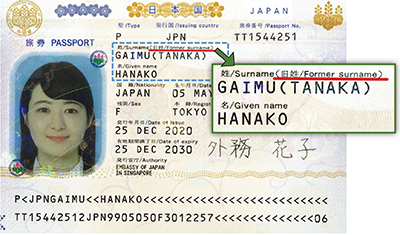
In 2020, there were 15 confirmed cases of illicit acquisitions of passports by impersonation or other means. Ten cases of illegal passport use overseas were also confirmed.
Following the introduction of ePassports in 2006, new security technologies are being proactively adopted. Measures have also been taken with the new 2020 passports to prevent forgery, including by bolstering the capacity for preventing personal information from being stolen from passports' IC chips, and using different design patterns on all the visa pages.
Based on a study by the International Civil Aviation Organization (ICAO), which sets out the international standards for passports, some countries in Europe, Asia and elsewhere are moving to introduce new technologies such as laser printing on thermoplastic material. Following these countries, Japan is aiming to introduce next-generation passports that incorporate these advanced technologies in FY2024.
In a passport index based on trustworthiness and other factors that was announced by a private-sector UK company in January 2021, Japanese passports ranked first out of 110 countries. In any event, MOFA will continue to engage in maintaining the trustworthiness of Japanese passports while enhancing convenience for applicants and making passport administrative operation more efficient.
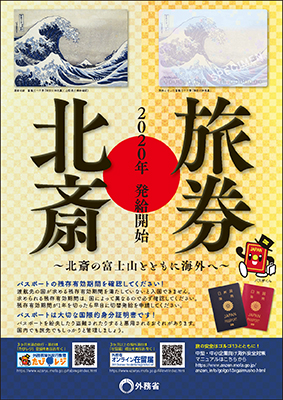 Poster announcing the issuance of the 2020 passport
Poster announcing the issuance of the 2020 passportIssuance of new passports commenced from applications received on February 4.
Passports incorporating new technologies have previously been developed, including machine-readable passports in 1992 and ePassports in 2006. For the passport that is currently in use, first issued in 2013, anti-counterfeiting measures have also been adopted through sophisticated technologies, such as black-and-white watermarks, holograms and special printing. This has brought the incidence of passport forgery or alteration to an extremely low level. Now, a new passport incorporating new technologies has been introduced for the further prevention of passport counterfeiting.
The integrated circuit (IC) chips in the new passport have reinforced functions to prevent the illicit reading and copying of personal information. Changes have also been made to the design on the visa pages with the introduction of the “Thirty-six Views of Mount Fuji*1” by the artist Katsushika Hokusai, as a way of preventing passport forgery or alteration. While every visa page in the passport has had the same design before this, printing a different picture on each page has made it even more difficult to forge or alter.
The decision to use beautiful Japanese designs for the visa pages was made from the viewpoint of preventing counterfeiting, and also for the purpose of contributing to the promotion of Japanese culture. In the selection of the basic design, the “Preparatory Conference for the Selection of the Next Passport Design” was convened by five expert members with specialized knowledge in the areas of design, travel, journalism and sports. The final decision was made by the Minister for Foreign Affairs based on their discussions about the multiple candidates under consideration.
Various designs were proposed, including designs based on the motif of unique Japanese scenes such as New Year's Day and the Doll's Festival (Hinamatsuri), the crane in association with traveling through the air, and plants that represent the seasons in Japan such as the cherry blossom. Based on factors such as Japanese character, dignity and familiarity, “Thirty-six Views of Mount Fuji” was selected as the final design. This is a masterpiece that is representative of the genre of Japanese art known as ukiyoe. Widely known around the world, the work is based on Mount Fuji, also a World Heritage Site.
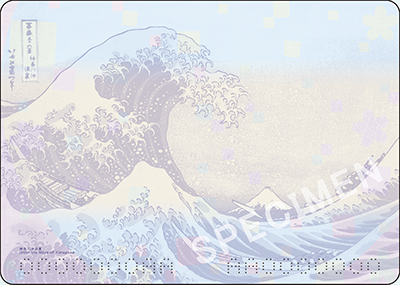 “Under the Wave off Kanagawa” from “Thirty-six Views of Mount Fuji” used in the design of the 2020 passport *2
“Under the Wave off Kanagawa” from “Thirty-six Views of Mount Fuji” used in the design of the 2020 passport *2The passport with ten years of validity has 48 visa pages, and one print is used for every two-page spread. Hence, 24 prints are used in total (18 prints in the 36-page passport with five years of validity). In considering which of the “Thirty-six Views of Mount Fuji” to be used in this passport, consideration was given to the balance of the design and the objectivity of the selection method. In the end, it was decided that the first 24 prints would be used, based on the titles of the prints in the order of the Japanese syllabary.
Since the start of the issuance of the new passport in February, the impact of the global spread of the novel coronavirus disease has resulted in a significant drop in the number of passports issued in Japan. However, those who did receive the new passport have spoken favorably about the new design that uses the “Thirty-six Views of Mount Fuji” artwork.
- *1 “Thirty-six Views of Mount Fuji” is a series of ukiyoe woodblock prints based on the theme of Mount Fuji created by Katsushika Hokusai (1760-1849), a master of ukiyoe in the mid- and late Edo era. Renowned prints from this series include “South Wind, Clear Sky,” “Under the Wave off Kanagawa,” and “Rainstorm Beneath the Summit.” The series comprised 36 prints at the time of their publication, but due to their popularity, 10 prints were added to make a total of 46 prints.
- *2 Visit the link below to see the other prints from the “Thirty-six Views of Mount Fuji” used in the 2020 passport.https://www.mofa.go.jp/mofaj/files/000432933.pdf

(3) Overseas Voting
The overseas voting system allows Japanese voters living overseas to vote in national elections. In order to vote through the overseas voting system, it is necessary to be registered in advance on the overseas voter directory managed by the election board of the city or town government and to obtain overseas voter identification. Starting in June 2018, in addition to the conventional method of applying through a diplomatic mission overseas after moving there, Japanese nationals can now apply at their municipal service counter at the same time as filing their notice of moving overseas. As a result, there is no longer a need to appear in person at a diplomatic mission overseas after moving outside Japan, which simplifies procedures. Voters can vote by choosing one of the three methods of voting, a) voting at diplomatic missions overseas, b) voting by mail, or c) voting in Japan.
The diplomatic missions overseas have been making efforts to spread the overseas voting system and to increase the number of registered voters by publicizing the overseas voting system to the territories under their jurisdiction and carrying out a visiting service for the registration of Japanese nationals living in remote areas. In addition, whenever an election is held, diplomatic missions overseas are responsible for voting administration, including PR prior to elections.
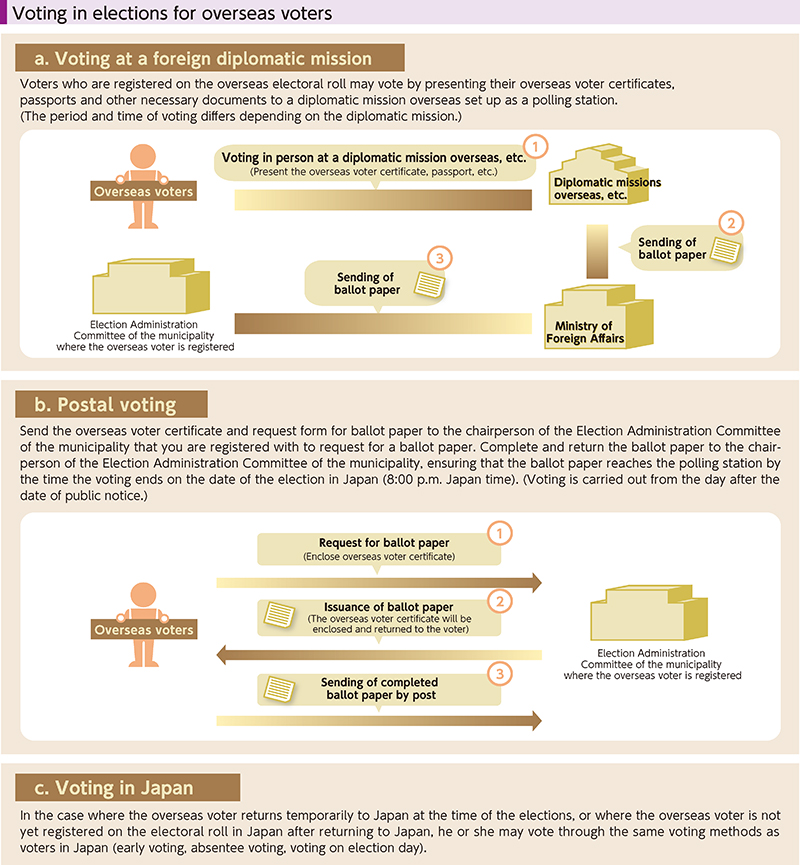
(4) Assistance for Japanese Nationals Living and Engaging in Activities Overseas
A Japanese Schools and Supplementary Education Schools
Education for children is one of the major concerns for Japanese nationals living abroad. In cooperation with the Ministry of Education, Culture, Sports, Science and Technology, MOFA provides assistance to the Japanese Schools (partial assistance for school building rental fees, remuneration for locally hired teachers, and safety measures expenses) so that the overseas school children at the age of compulsory education in Japan can receive a level of education equivalent to that in Japan. MOFA also provides the same assistance for Japanese Schools to Supplementary Education Schools (educational institutions established to maintain children's academic ability, such as Japanese language proficiency) mainly in areas where Japanese Schools are not located. In particular, MOFA is further strengthening and expanding assistance related to safety measures in light of the recent changes in the international terrorism situation. MOFA will continue providing these forms of support in the future.
B Medical/Health Measures
MOFA gathers information on infectious diseases being spread overseas and provides this information to a broad audience through the overseas safety website, websites of diplomatic missions overseas, emails and other means. Furthermore, in order to provide health advice through consultations to Japanese nationals residing in countries where the medical situation is poor, MOFA dispatches medical teams with the cooperation of domestic medical institutions (not implemented in FY2020 due to the impact of COVID-19). MOFA also dispatches medical specialists to regions where infectious diseases or air pollution are becoming serious issues, and organizes health and safety lectures (not implemented in FY2020 due to the impact of COVID-19).
C Support for Japanese Nationals Living Overseas and Japanese Descendants (Nikkei)
Between March and December 2021, in order to support Japanese nationals living overseas and Japanese descendants (Nikkei) whose lifestyles are being disrupted by the spread of COVID-19, MOFA carried out the Program to Strengthen Livelihood and Business Foundations for Japanese Nationals Overseas and People of Japanese Descent (Nikkei) through support for projects that are being implemented by Japan societies, Japanese chambers of commerce and industry and Nikkei groups overseas for the purposes of halting the spread of infections in communities of Japanese living overseas and Nikkei communities, and nurturing their business environments.
D Responses to Other Needs
In order to eliminate the complexity of various procedures for Japanese nationals living overseas (such as converting Japanese driver's licenses, obtaining residence/work permits) and to make living abroad more comfortable, MOFA continues to engage with the authorities in the respective countries where Japanese nationals reside.
For example, when converting driver's licenses issued in foreign countries to Japanese driver's licenses, all persons with driver's licenses issued in a foreign country are exempted from taking certain sections of the Japanese driver's license examination (theory/practical), when it has been confirmed that they have no problems with driving vehicles. On the other hand, as it is mandatory for Japanese nationals to take driving tests when converting Japanese driver's licenses to local licenses in some countries and states, MOFA is calling for those countries to simplify the procedures for license conversion to the same degree as in Japan.
MOFA also supports victims of atomic bombings living overseas in applying for the authorization of Atomic Bomb Diseases and for the issuance of Health Check Certificates, via diplomatic and consular missions.

